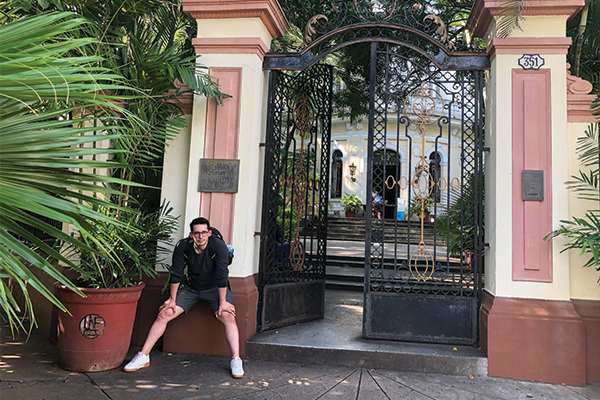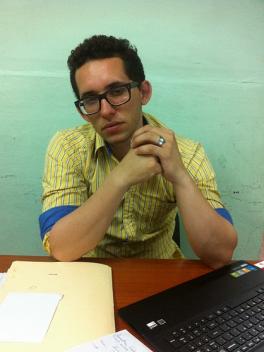The Living Imprint of Immigrant Authors

By PhD Student Julian Marcel Baldemira, Department of Spanish and Portuguese

For decades, immigrants from Cuba have arrived on U.S. soil and established themselves in Florida. Cubans have been among the top ten immigrant populations in the country since 1970, and in 2016, nearly 1.3 million Cubans lived in the United States. I am one of them.
I arrived in 2016, and after my first year, I noticed how my writing and thoughts were changing. I was trying to understand the new culture and its nuances; I was attempting to make a new home; but I felt displaced. Therefore, I wrote and wrote. The Migration, Mobility and Immobility Project grant gave me the opportunity of researching displacement in two communities of writers located in both Cuba and the United States.
I spent over a month traveling and interviewing with these writers from Havana and Miami. During my time living there, I also visited key places for Cuban literature, such as the UNEAC and Casa de las Américas. What started as a chapter of my master's thesis, rapidly became a fiction book project: Perros en la frontera [Dogs at the border], nourished also by the tutoring of Professor Paloma Martínez-Cruz. This book, to be publish by Editorial La Luz in the autumn of 2020, shows, through short narratives interconnected as a Rubik cube, how the displacement of individuals (some of them writers) influences an itinerant reality that is part of the culture of a human group.
The ability to communicate that scriptural individuality, peculiar characteristic of the human race, the creation, propagation, preservation and use of these texts-documents, has played a key role in the development of civilization since ancient times. Stories like Masa para albóndigas demonstrate that as soon as one decides to emigrate, the traumatic consequences of migration begin to take hold; the desire to escape hostile environments, among other causes, leads the writer to create stories about protagonist authors, intertwining realistic and fantastical elements while traveling in the world of the terrifying.
Nothing is easy for those preparing to cross the boundaries of their comfort zone and leave behind family, friends and familiar environments, even their identity, their knowledge. The need to reduce this deficit is then evident and can be addressed by stimulating the creation and research of literary texts that respond to the inherent concerns of those who migrate — a major and necessary effort resulting from the preservation of cultural traces emerging in that individual, reservoir of traces of the community and its memory. The identity of trans-human human groups settled in other latitudes is nourished by the wisdom of contemporary migrant authors, destined to live together, make exchanges of all kinds, share literary experiences, cultural messages that would represent a factor of integration or approach to otherness.
The "Galveston" short story shows the bleeding that coordinates emigration. The main character, in an emotional unfolding, emphasizes "To all those who left sent photos in which I smile from museums and locations with lots of light, I look happy, but they don’t know that everything is a montage." This pain must be named in order to promote an effective approach to absences that cause harm to his psyche and prevent him from becoming a full member of the cultural world to which we all belong.
Who does the road? The man. Why have they called him a migrant? It is nothing more than the habit of naming, identifying, restricting freedom, reifying reality. The migrant carries within himself the fable, the myth, the legend, a precious entity, a fragile deposit that must be saved in any place that arises, either at the beginning of the road or in its uncertain half, we all work to reveal the different faces of migration, either forced by socioeconomic components or the decision of the individual in a moment of voluntariness and own decision.
The migrant carries loyalties with his group of origin and acquires others, valid, because the migrant is an acting being in the new reality. Perros en la frontera is a way to extend the hand to migrant authors who leave their living imprint in their host countries. The poet writes "I would like to live in a country without borders." Man needs to live, be contemporary, inhabitant of a world without dividing barriers. This book-text-document would shorten them. Man is the first book in the world: let's read it.
